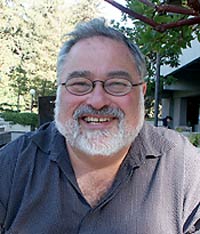UC Berkeley Point of View
What's in a word? Plenty, if the word is 'marriage'
George Lakoff, the author of this article, is a professor of Linguistics at UC Berkeley and senior fellow at the Rockridge Institute, and author of "Moral Politics: How Liberals and Conservatives Think." A version of this article was previously published by AlterNet.
 George Lakoff (Bonnie Powell photo) |
BERKELEY – What's in a word? Plenty, if the word is "marriage."
Marriage is central to our culture. Marriage legally confers over 600 benefits, but that is only its material aspect. Marriage is an institution, the public expression of lifelong commitment based on love. It is the culmination of a period of seeking a mate, and, for many, the realization of a major goal, often with a build-up of dreams, dates, gossip, anxiety, engagement, shower, wedding plans, rituals, invitations, bridal gown, bridesmaids, families coming together, vows, and a honeymoon. Marriage is the beginning of family life, commonly with the expectation of children and grandchildren, family gatherings, in-laws, little league games, graduations, and all the rest.
Marriage is also understood in terms of dozens of deep and abiding metaphors: a journey through life together, a partnership, a union, a bond, a single object of complementary parts, a haven, a means for growth, a sacrament, a home. Marriage confers a social status -- a married couple with new social roles. And for a great many people, marriage legitimizes sex. In short, marriage is a big deal.
The conservatives are using two powerful ideas: definition and sanctity. We must take them back. We have to fight definition with definition and sanctity with sanctity. For both sides, "marriage," as an ideal, is defined as, "the realization of love through a lifelong public commitment." Love is sacred. The sanctity in marriage is the sanctity of love and commitment.
Like most important concepts, marriage also comes with a variety of prototypical cases: The ideal marriage is happy, lasting, prosperous, with children, a nice home, and friendships with other married couples. The typical marriage has its ups and downs, its joys and difficulties, typical problems with children and in-laws. The nightmare marriage ends in divorce, due perhaps to incompatibility, abuse, or betrayal. It is a rich concept.
None of the richness we have just discussed requires marriage to be heterosexual - not its definition, its sanctity, its rituals, its family life, its hopes and dreams. The locus of the idea that marriage is heterosexual is in a widespread cultural stereotype.
In evoking this stereotype, language is important. The radical right uses "gay marriage." Polls show most Americans overwhelmingly against anti-gay discrimination, but equally against "gay marriage." One reason, I believe, is that "marriage" evokes the idea of sex and most Americans do not favor gay sex. Another is that the stereotype of marriage is heterosexual. "Gay" for the right connotes a wild, deviant, sexually irresponsible lifestyle. That's why the right prefers "gay marriage" to "same-sex marriage."
But "gay marriage" is a double-edged sword. President Bush chose not to use the words "gay marriage" in his State of the Union Address. I suspect that the omission occurred for a good reason. His position is that "marriage" is defined as between a man and a woman, and so the term "gay marriage" should be an oxymoron, as meaningless as "gay apple" or "gay telephone." The more "gay marriage" is used, the more normal the idea of same-sex marriage becomes, and the clearer it becomes that "marriage" is not defined to exclude the very possibility. This is exactly why some gay activists want to use "same-sex marriage" or even "gay marriage. "
Because marriage is central to family life, it has a political dimension. As I discuss in my book Moral Politics, conservative and progressive politics are organized around two very different models of married life: a strict father family and a nurturing parent family.
The strict father is moral authority and master of the household, dominating both the mother and children and imposing needed discipline. Contemporary conservative politics turns these family values into political values: hierarchical authority, individual discipline, military might. Marriage in the strict father family must be heterosexual marriage: the father is manly, strong, decisive, dominating -- a role model for sons and a model for daughters of a man to look up to.
The nurturing parent model has two equal parents, whose job is to nurture their children and teach their children to nurture others. Nurturance has two dimensions: empathy and responsibility, for oneself and others. Responsibility requires strength and competence. The strong nurturing parent is protective and caring, builds trust and connection, promotes family happiness and fulfillment, fairness, freedom, openness, cooperation, community development. These are the values of a strong progressive politics. Though the stereotype again is heterosexual, there is nothing in the nurturing family model to rule out same-sex marriage.
In a society divided down the middle by these two family models and their politics, we can see why the issue of same-sex marriage is so volatile. What is at stake is more than the material benefits of marriage and the use of the word. At stake is one's identity and most central values. This is not just about same-sex couples. It is about which values will dominate in our society.
